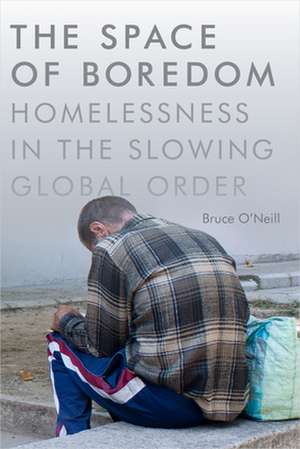The Space of Boredom – Homelessness in the Slowing Global Order
Autor Bruce O`neillen Limba Engleză Hardback – 6 apr 2017
| Toate formatele și edițiile | Preț | Express |
|---|---|---|
| Paperback (1) | 261.38 lei 6-8 săpt. | |
| MD – Duke University Press – 6 apr 2017 | 261.38 lei 6-8 săpt. | |
| Hardback (1) | 777.20 lei 6-8 săpt. | |
| MD – Duke University Press – 6 apr 2017 | 777.20 lei 6-8 săpt. |
Preț: 777.20 lei
Preț vechi: 1009.35 lei
-23% Nou
148.72€ • 155.79$ • 123.25£
Carte tipărită la comandă
Livrare economică 08-22 aprilie
Specificații
ISBN-10: 0822363143
Pagini: 280
Dimensiuni: 161 x 235 x 24 mm
Greutate: 0.54 kg
Editura: MD – Duke University Press
Cuprins
Acknowledgments xvii
Introduction 1
1. Space-Time Expansion 19
2. Bleak House 44
3. The Gray Years 72
4. Bored to Death 96
5. Bored Stiff 122
6. Defeat Boredom! 147
Conclusion 175
Notes 185
Bibliography 229
Index 245
Notă biografică
Descriere
In The Space of Boredom Bruce O'Neill explores how those people cast aside by globalism deal with an intractable symptom of downward mobility: an unshakeable and immense boredom. Focusing on Bucharest, Romania, where the 2008 financial crisis compounded the failures of the postsocialist state to deliver on the promises of liberalism, O'Neill shows how the city's homeless are unable to fully participate in a society that is increasingly organized around practices of consumption. Without a job to work, a home to make, or money to spend, the homeless who include pensioners abandoned by their families and the state struggle daily with the slow deterioration of their lives. O'Neill moves between homeless shelters and squatter camps, black labor markets and transit stations, detailing the lives of men and women who manage boredom by seeking stimulation, from conversation and coffee to sex in public restrooms or going to the mall or IKEA. Showing how boredom correlates with the downward mobility of Bucharest's homeless, O'Neill theorizes boredom as an enduring affect of globalization to provide a foundation from which to rethink the politics of alienation and displacement."









